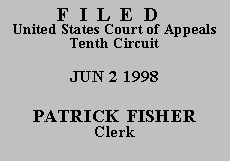

| BERTHA BUTLER,
Plaintiff-Appellant, v. UNITED STATES OF AMERICA, Defendant-Appellee. |
No. 97-5081 (D.C. No. 96-CV-117-C) (Northern District of Oklahoma) |
By answer the United States denied that its employee, Dr. Virginia Kopelman who performed the surgery on Butler, was negligent and further alleged that no act of Dr. Kopelman caused the paralysis of Butler's vocal cord. The parties filed an agreed pre-trial order on December 6, 1996. The case was tried to the district court in a two-day trial commencing on January 21, 1997. At the conclusion thereof the district court took the case under advisement and allowed counsel to submit proposed findings of fact and conclusions of law. On March 24, 1997, the district court filed its findings of fact and conclusions of law in a 21-page order. After detailing the evidentiary matter adduced by the parties in considerable detail, the district court found, in short, that Butler had failed to establish that Dr. Kopelman was negligent or that the lobectomy she performed caused the paralysis of Butler's vocal cord. Butler appeals. We affirm.
On appeal, counsel's position is that the district court's findings and conclusions are not supported by the record and are therefore clearly erroneous. However, our reading of the record leads us to conclude that the evidence is not as "one-sided" as counsel suggests. The evidence was in many particulars conflicting in nature, as were the inferences therefrom. No good purpose would be served in summarizing here the considerable medical testimony adduced by the parties at trial. It is sufficient to say that the evidence regarding negligence and causation was conflicting, and that the district court's resolution of those matters is supported by the record. In other words, we do not have a firm conviction that the district court made a mistake. See Gutierrez v. Denver Post, Inc., 691 F.2d 945, 946 (10th Cir. 1982). For us to reverse the district court would mean that we are finding the facts anew. It was the district court that heard the various witnesses and assessed their credibility. As stated, from its 21-page memorandum order it would appear that the district court gave this case careful consideration. We decline counsel's suggestion that the district court's findings and conclusions constitute "clear error."
One other matter deserves brief comment. At the pre-trial conference, Butler's counsel indicated, for the first time, that one aspect of Butler's claim of negligent surgery was lack of "informed consent" to the operation, although she had signed a consent form prior to her surgery. The district court refused to allow Butler to pursue this particular matter at trial, since it had not been mentioned in either the administrative claim filed by Butler or in her complaint in the district court. Under those circumstances, we find no error. As far as we can tell, no language in Butler's administrative claim would alert the reader thereof that one aspect of Butler's claim of negligence was lack of informed consent to the operation. See Murrey v. United States, 73 F.3d 1448, 1453 (7th Cir. 1996); Bush v. United States, 703 F.2d 491, 495 (11th Cir. 1983). Butler's administrative claim, incidentally, is not set forth in its entirety in the record before us. However, it would appear that the only complaint to the administrative agency was that the doctor was negligent in performing the surgery on her. At least that was the gist of the affidavit of Dr. Samuel H. Esterkyn which was attached to the administrative claim and is a part of the record on appeal. And certainly nothing in Butler's complaint filed in the district court suggested that she was asserting a claim based on lack of informed consent.
In this general connection, we note that the Federal Tort Claims Act is a partial waiver of the government's sovereign immunity, and that the notice requirements of the Act are to be strictly construed. In Bradley v. United States, 951 F.2d 268, 270 (10th Cir. 1991) we spoke as follows:
The federal court derives its jurisdiction to entertain claims for damages against the United States from 28 U.S.C. § 2675(a). Section 2675(a) requires that claims for damages against the government be presented to the appropriate federal agency by filing "(1) a written statement sufficiently describing the injury to enable the agency to begin its own investigation, and (2) a sum certain damages claim." Warren v. United States Dep't Of Interior Bureau of Land Management, 724 F.2d 776, 780 (9th Cir. 1984). Because the FTCA constitutes a waiver of the government's sovereign immunity, the notice requirements established by the FTCA must be strictly construed. Three-M Enter., Inc. v. United States, 548 F.2d 293, 295 (10th Cir. 1977). The requirements are jurisdictional and cannot be waived. Id. At 294.
Judgment affirmed.
ENTERED FOR THE COURT
PER CURIAM
*. This order and judgment is not binding precedent, except under the doctrines of law of the case, res judicata, and collateral estoppel. The court generally disfavors the citation of orders and judgments; nevertheless, an order and judgment may be cited under the terms and conditions of 10th Cir. R. 36.3